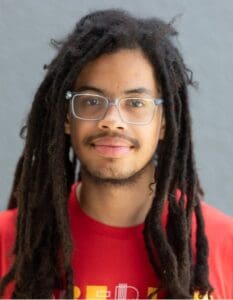
At Qualia High School graduation, seniors Terrin Busby Thompson (left) and Diego Martinez-Hahn, pose with school founder Jim Hahn. Photo: Maggie Storm
Colleges offered more than $2 million in merit scholarships this spring to Terrin Busby Thompson, a senior at Qualia: The School for Deeper Learning, a Calabasas school co-founded by Sunset Mesa resident Jim Hahn.
Busby Thompson eventually turned down all of this money, which included a four-year full-tuition/room-and-board scholarship to Clark University and a four-year full-tuition scholarship to Sarah Lawrence College, to attend the Massachusetts Institute of Technology.
“I know anything I take at MIT is going to be modern and the newest in its field,” Busby Thompson said about his eventual choice. Also, upon visiting MIT, “I found spaces where I felt really comfortable, and I met people I could really connect with. Everyone there is so driven, which produces an environment that’s really supportive of doing things one enjoys.”
This emphasis on connection, advanced knowledge, and individual pursuits dovetails with the mission of his high school, Qualia. Over his years there, which began at its former location in West Los Angeles, Busby Thompson explored topics ranging from travel in hyperspace to music production with traditional Japanese instruments. Because the Las Virgenes Road school encourages students to create projects to demonstrate their learning, he made both songs and video games for multiple courses, ranging from Japanese to Advanced Literary Analysis, in addition to writing critical essays on topics that intrigued him.
Hahn, who grew up and still lives in the Sunset Mesa area, noted that this focus on interests and passions not only made Busby Thompson’s high school experience a learning adventure, it also paid off when applying to colleges.
“I really like it when kids aren’t obsessed with the admissions game and lean into pursuing their passions to the fullest,” said Hahn, whose parents, Jim, a former Palisades Rotary Club president, and Jeanne, live next door to him. “In Terrin’s case, it’s gratifying to see that leading his life that way has translated into such success.”
The approach has also worked for other Qualia graduates, including Hahn’s children, who both attended the school, which opened 16 years ago in West L.A.
Amy, 20, will graduate from Pitzer College next year with a degree in sustainability and the built environment, while Diego, 18, is headed to Vassar College this fall to study his biggest passion, anthropology, an interest he shares with his father, who earned a Fulbright Scholarship to study medical anthropology on the island of Yap after earning his master’s in anthropology at UC San Diego in 1991.
Busby Thompson’s biggest passions center around all aspects of video game creation, including music, programming, story creation, and art, but he also is fascinated by philosophy, mathematics, and the mythology of cultures around the world. His goal in shopping for colleges was to find a place where he could feel at home while continuing this combination of explorations.
MIT wasn’t his dream school. In fact, before his admittance, he spent little time thinking about MIT and similarly competitive colleges that are sometimes described as “highly rejective,” such as Brown University and Carnegie Mellon University, two schools where he also gained entrance.
He felt the likelihood of acceptance was so low, around 4 percent at MIT and Brown and in the computer science department at CMU, that he focused instead on learning about the variety of other colleges that were likely to admit him and would offer avenues for him to pursue his interests in a collaborative and creative atmosphere.
He knew his qualifications were strong. He was named a National Merit Semifinalist in the fall, plays both piano and alto saxophone, and was a straight-A student with strong extra-curricular activities, including long tenures in the NTYME Jazz Band and UCLA Math Circle.
His college counselor had complimented his essays, calling one “a masterful piece of work” that could be used “as a model to teach other students how to write these kinds of essays.” Busby Thompson also expected to receive enthusiastic recommendations from his Qualia teachers with whom he had developed particularly close relationships through his small, passion-driven classes.
He hoped that multiple acceptances would come his way, but he had no idea that he would be in store for so many and that they would be accompanied by such hefty scholarships. For example, Case Western Reserve University offered him $174,000 over four years, while both Occidental College and the University of Redlands gave him scholarships worth $140,000 to encourage him to pick their schools.
In fact, by April 1, he had become so overwhelmed by acceptances and financial enticements that he knew he could study happily at more than a dozen schools, including Oberlin College and Conservatory, Grinnell College, and Chapman University. He also received offers of strong financial aid (more than $1 million for his freshman year alone) from schools that give few, if any, merit scholarships, but do meet applicants’ need, including not only Brown, Carnegie Mellon, and MIT, but Harvey Mudd College, Reed College, Swarthmore College, Williams College, Emory University, and Washington University in St. Louis.
“I’m honestly a bit sad that I don’t get to attend some of the other places, but there’s only one you can choose in the end,” Busby Thompson said.
For other students beginning the college application process, he offered one piece of advice from his intensive college search.
“The biggest thing I learned was that the colleges really want to find people that are good fits for them,” he said. “The numbers are important, but, at some point, that becomes a starting point. Then, you have to tell them who you are and how that intersects with their mission.”
Hahn agreed. He advises students, “Be passionately weird. Figure out what makes you weird and lean into it.”


